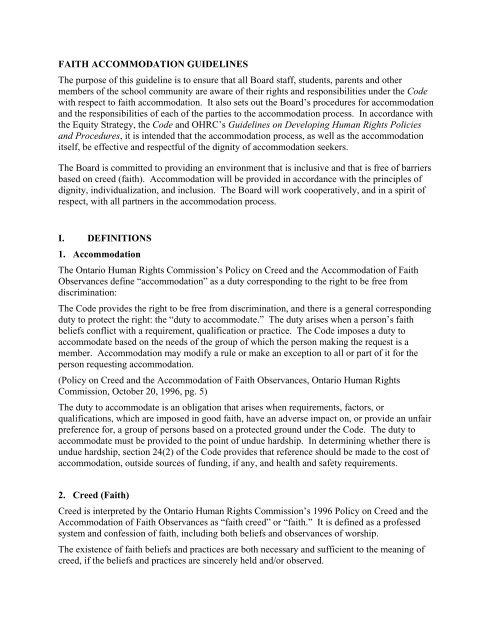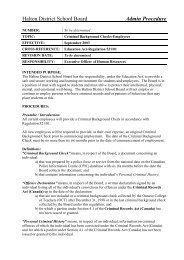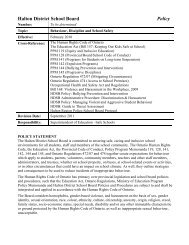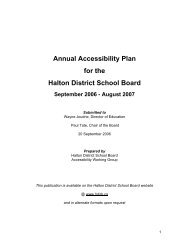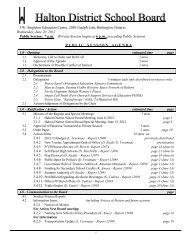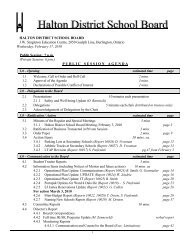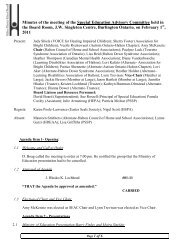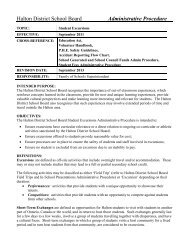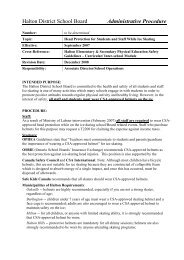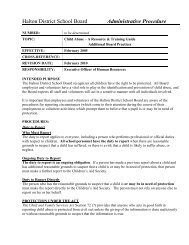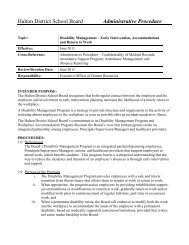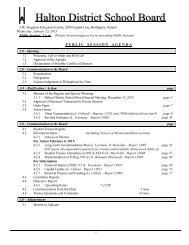Faith Accommodation - Halton District School Board
Faith Accommodation - Halton District School Board
Faith Accommodation - Halton District School Board
Create successful ePaper yourself
Turn your PDF publications into a flip-book with our unique Google optimized e-Paper software.
FAITH ACCOMMODATION GUIDELINES<br />
The purpose of this guideline is to ensure that all <strong>Board</strong> staff, students, parents and other<br />
members of the school community are aware of their rights and responsibilities under the Code<br />
with respect to faith accommodation. It also sets out the <strong>Board</strong>’s procedures for accommodation<br />
and the responsibilities of each of the parties to the accommodation process. In accordance with<br />
the Equity Strategy, the Code and OHRC’s Guidelines on Developing Human Rights Policies<br />
and Procedures, it is intended that the accommodation process, as well as the accommodation<br />
itself, be effective and respectful of the dignity of accommodation seekers.<br />
The <strong>Board</strong> is committed to providing an environment that is inclusive and that is free of barriers<br />
based on creed (faith). <strong>Accommodation</strong> will be provided in accordance with the principles of<br />
dignity, individualization, and inclusion. The <strong>Board</strong> will work cooperatively, and in a spirit of<br />
respect, with all partners in the accommodation process.<br />
I. DEFINITIONS<br />
1. <strong>Accommodation</strong><br />
The Ontario Human Rights Commission’s Policy on Creed and the <strong>Accommodation</strong> of <strong>Faith</strong><br />
Observances define “accommodation” as a duty corresponding to the right to be free from<br />
discrimination:<br />
The Code provides the right to be free from discrimination, and there is a general corresponding<br />
duty to protect the right: the “duty to accommodate.” The duty arises when a person’s faith<br />
beliefs conflict with a requirement, qualification or practice. The Code imposes a duty to<br />
accommodate based on the needs of the group of which the person making the request is a<br />
member. <strong>Accommodation</strong> may modify a rule or make an exception to all or part of it for the<br />
person requesting accommodation.<br />
(Policy on Creed and the <strong>Accommodation</strong> of <strong>Faith</strong> Observances, Ontario Human Rights<br />
Commission, October 20, 1996, pg. 5)<br />
The duty to accommodate is an obligation that arises when requirements, factors, or<br />
qualifications, which are imposed in good faith, have an adverse impact on, or provide an unfair<br />
preference for, a group of persons based on a protected ground under the Code. The duty to<br />
accommodate must be provided to the point of undue hardship. In determining whether there is<br />
undue hardship, section 24(2) of the Code provides that reference should be made to the cost of<br />
accommodation, outside sources of funding, if any, and health and safety requirements.<br />
2. Creed (<strong>Faith</strong>)<br />
Creed is interpreted by the Ontario Human Rights Commission’s 1996 Policy on Creed and the<br />
<strong>Accommodation</strong> of <strong>Faith</strong> Observances as “faith creed” or “faith.” It is defined as a professed<br />
system and confession of faith, including both beliefs and observances of worship.<br />
The existence of faith beliefs and practices are both necessary and sufficient to the meaning of<br />
creed, if the beliefs and practices are sincerely held and/or observed.


